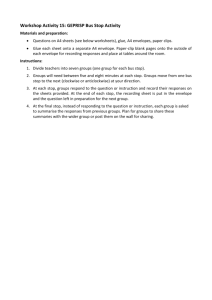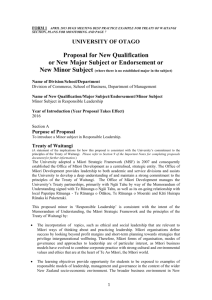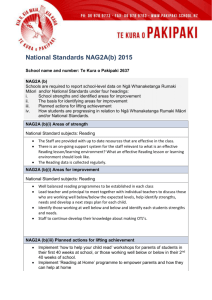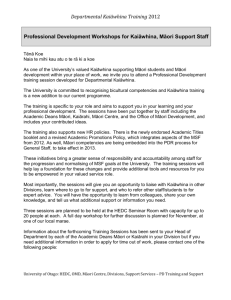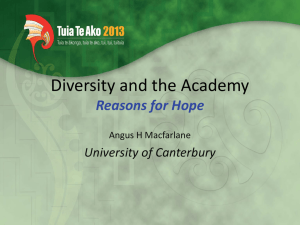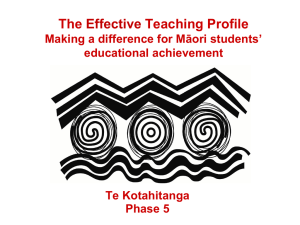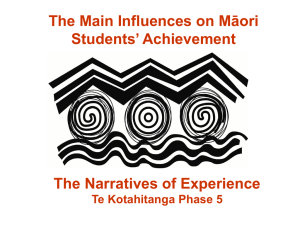Mixed Ownership Model Submission Form
advertisement
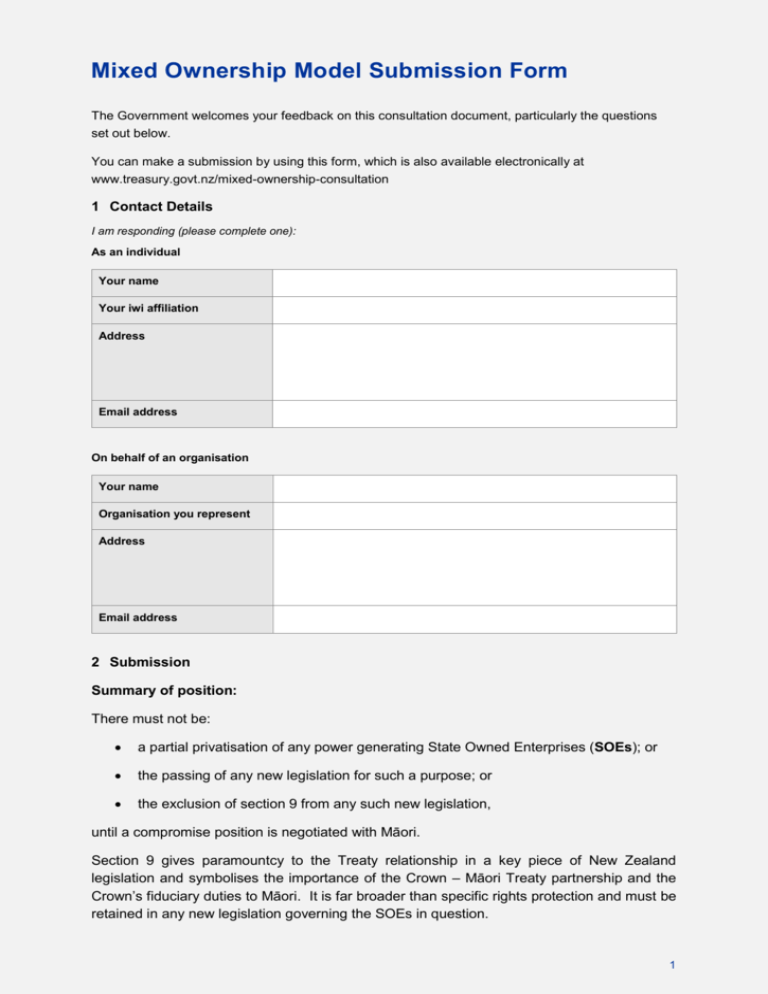
Mixed Ownership Model Submission Form The Government welcomes your feedback on this consultation document, particularly the questions set out below. You can make a submission by using this form, which is also available electronically at www.treasury.govt.nz/mixed-ownership-consultation 1 Contact Details I am responding (please complete one): As an individual Your name Your iwi affiliation Address Email address On behalf of an organisation Your name Organisation you represent Address Email address 2 Submission Summary of position: There must not be: a partial privatisation of any power generating State Owned Enterprises (SOEs); or the passing of any new legislation for such a purpose; or the exclusion of section 9 from any such new legislation, until a compromise position is negotiated with Māori. Section 9 gives paramountcy to the Treaty relationship in a key piece of New Zealand legislation and symbolises the importance of the Crown – Māori Treaty partnership and the Crown’s fiduciary duties to Māori. It is far broader than specific rights protection and must be retained in any new legislation governing the SOEs in question. 1 Question 1: What rights and interests, if any, do Māori have in the Mixed Ownership Model Companies that are not protected by the section 27A-D memorials regime, or by other legislation? This question is framed specifically at Māori identifying specific rights and interests in particular resources other than land. However, the purpose of section 9 is far broader than specific rights protection. Section 9 gives paramountcy to the Treaty relationship in a key piece of New Zealand legislation and symbolises the importance of the Crown – Māori Treaty partnership and the Crown’s fiduciary duties to Māori. This is the purpose of section 9. The fact that it protects specific Treaty rights (for example, over specific resources and assets), and has done so in the past, is a natural incident of its primary purpose. Sections 27A-D give practical effect to some, but not all, of the obligations imposed by section 9. In that regard, the section 27A-D obligations can be viewed as a “subset” of the wider obligations imposed by section 9. By framing question 1 in this way skews the debate away from the principles of the Treaty, and Māori and the Crown’s obligations to each other under the Treaty relationship, to a focus on specific rights protection which unduly narrows the purpose of section 9 for the benefit of the Crown’s position that the memorial regime (sections 27A-D) will provide adequate protection for Māori. However, notwithstanding that position, in an attempt to answer question 1, the Treaty of Waitangi reaffirms the right of Māori communities to exercise tino rangatiratanga over their freshwater and geothermal resources. This includes rights, and corresponding obligations, to protect, preserve, control, regulate, use, and develop those resources. Māori have not willingly sold either their tino rangatiratanga or control over freshwater and geothermal resources. Nor have Māori consented to the sale of these SOEs without a meaningful discussion about how Māori rights and interests in the SOEs are recognised and protected. Question 2: How would any rights and interests identified in question 1 be protected by continued application of section 9 of the State-Owned Enterprises Act 1986? Section 9 of the SOE Act imposes specific obligations of good faith, active protection and the provision of redress. Sections 27A-D specify how those obligations can be satisfied in relation to land only. They do not specify how those obligations are to be satisfied for any other function under the SOE Act. The orthodox position at law is that international treaties (of which the Treaty is considered one) are unenforceable in the courts unless specifically incorporated into New Zealand law through an Act of Parliament. On that basis, the principles of the Treaty are not enforceable in the courts unless they have been incorporated into relevant legislation. Excluding section 9 of the SOE Act from the new legislation will remove the jurisdiction of the Courts to consider whether Crown conduct regarding the mixed ownership model and the SOEs in question is Treaty compliant. The Crown would no longer have a statutory duty to act in a manner consistent with the principles of the Treaty. In the absence of such a duty, the Courts will have limited jurisdiction to interpret and review Crown conduct. Therefore, the rights and interests identified in question 1 will be protected by the retention of section 9 given its purpose and wide-reaching application to protect interests other than land. Excluding from any new legislation governing the 51% of power generating companies, the protection that section 9 of the SOE Act brings, is prejudicial to Māori. It directly removes the legislative requirement for the Crown to act in a manner that is consistent with the 2 principles of the Treaty of Waitangi in respect of that remaining shareholding and consequently reduces the prospects and the potential enforceability of any relief recommended by the Waitangi Tribunal or other courts in present or future cases. Further, any suggestions that section 9, if retained, would apply to private sector assets is misleading. Section 9, if retained, would only apply to the Crown’s shareholding, which is not a private sector asset. Question 3: Could any rights and interests identified in question 1 be protected by an alternative, more specific, formulation of the Crown’s obligations under the Treaty? Section 9 should be retained and included in any new legislation governing the partial sale of the SOEs. Section 9 is a current legal obligation that is enforceable in the Courts and is the strongest reference in New Zealand’s statute books to the Crown’s obligations in respect of the Treaty principles. It is unambiguous in terms of the legal status it gives to those principles as it renders unlawful any act of the Crown that is not consistent with those principles. Any reformulation of section 9 by the Crown would risk limiting the Crown’s responsibilities and oversight with respect to the SOEs to specific situations framed by the Crown. However, in the event that the Crown attempt a reformulation of section 9 in any new legislation, in order to effectively protect Māori rights and interests, any such alternative formulation of the Crown's obligations would need to recognise and provide for the following: It is not possible to articulate every incident that may require Māori input. Any reformulation that is example specific needs to be avoided. This is why section 9 was drafted as it was – to capture a broad range of circumstances that could not be predicted at the time it was drafted. All available land or interests in land which are used or have been used for or in connection with the generation or transmission of hydro-electricity or geothermal electricity and are memorialised under section 27B of the SOE Act 1986 should be returned to Māori. Māori also require compensation for past use of freshwater and geothermal resources, compensation for loss or rights or the ability to profit from economic use of those freshwater and geothermal resources (for example power production) and payment for future use of the proprietary interest in those freshwater and geothermal resources. Amendments need to be made to the Resource Management Act 1991 and any other relevant legislation required to provide for future Māori rangatiratanga and control over freshwater and geothermal resources. 3 Additional comments: Please insert any other comments you wish to make on this consultation document. The partial sale of the power generating SOEs will: make the prospect of securing section 27B resumption of any of the assets of the power generating companies highly unlikely; create further barriers for Māori resulting in Māori continuing to have no or no adequate redress for their freshwater and geothermal claims; and significantly reduce the pool of assets and range of potential remedies practically available to the claimants will be reduced. Power generating SOEs should be retained in 100% Crown ownership, and should not be sold/privatised until such time as Māori claims are resolved or Māori otherwise agree and are satisfied with the protections offered by the Crown. All submissions will be publicly available The Government will publicly release your submission, a summary of submissions and a list of the names of submitters, on The Treasury’s website: www.treasury.govt.nz/mixed-ownership-consultation. Your name will be made publicly available as part of your submission when it is released Your contact details will be removed from your submission before it is posted on the website, recorded in the summary of submissions or released under the Official Information Act 1982 (OIA). If you do not wish your name in your submission to be released, please clearly state this in your submission or tick the option below: I request that my name be removed from my submission before it is released and that it is recorded as ‘anonymous’ in the summary of submissions. If there is particular information in your submission that you wish to remain confidential, please clearly indicate this and explain your reasons for wanting the information kept confidential. The Treasury is subject to the OIA and copies of submissions sent to The Treasury will normally be released in response to an OIA request from a member of the public. If your submission is subject to an OIA request, The Treasury will consider your confidentiality request in accordance with the grounds for withholding information outlined in the OIA. You can view a copy of the OIA on the New Zealand Legislation website: www.legislation.govt.nz. The Privacy Act 1993 governs how The Treasury collects, holds, uses and discloses personal information about you which is contained in your submission. You have the right to access and correct this personal information. Submissions can be sent by email to mixed-ownership-consultation@treasury.govt.nz or by post to: FreePost Authority No.126395 Mixed Ownership Model: Consultation with Māori Commercial Transactions Group The Treasury PO Box 3724 Wellington 6140 The deadline for receipt of submissions is 5pm on Wednesday 22 February 2012. Late submissions will not be considered. 4
